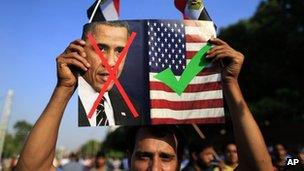When is a coup not a coup? With $1.5bn on the line
- Published
- comments

There is growing anger in Egypt towards US President Barack Obama
Here are a couple of riddles for you: When is a coup not a coup? And why is the White House not like Humpty Dumpty?
In Through the Looking Glass, Humpty tells Alice: "When I use a word, it means just what I choose it to mean - neither more nor less."
The White House press secretary, Jay Carney, doesn't have that luxury. If he called the Egyptian military's intervention in the democratic process a "coup", it would clearly mean the huge amount of aid the US gives to Egypt would have to be cut off.
Because that's what it says, in black and white, in the US Code, external:
"None of the funds appropriated or otherwise made available pursuant to this act shall be obligated or expended to finance directly any assistance to any country whose duly elected head of government is deposed by military coup or decree."
And it is not a few cents here and there - the president's plans are to give $1.5bn, external (£1bn) next year. There is also a suggestion that cutting the money would hurt US arms manufacturers.
So instead, Mr Carney talks of Mohammed Morsi's "removal" from office, saying it would not be in the US interest to cut off aid: "This is a complex and difficult issue with significant consequences."
Are they listening?
There will be a review and the cash could still be pulled. The president himself has not ventured an opinion.
But Senator John McCain has declared that aid should be stopped, despite his misgivings about Mr Morsi.
"It is difficult for me to conclude that what happened was anything other than a coup in which the military played a decisive role," he said.
"I do not want to suspend our critical assistance to Egypt, but I believe that is the right thing to do at this time."
It may be that President Obama is weighing which of his options give him the most clout with the Egyptian military. But it is not clear they are listening.
The one consistent call from the White House has been for an end to the violence. Monday's events in Cairo, whomever you believe, do not fit that bill.
The trouble is that the White House looks powerless, when it obviously has a great deal of power and, quite literally, investment in Egypt.
In the end, Mr Obama's passivity may turn out to be level-headed diplomacy. But it looks bad to those who accuse him of prevaricating.
It doesn't feel like leadership, and the number of harsh judgments on his foreign policy is growing.